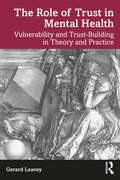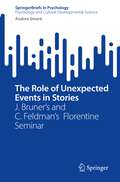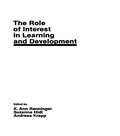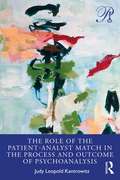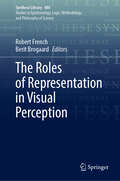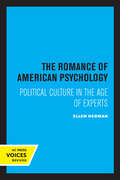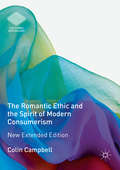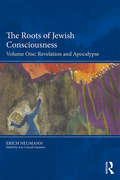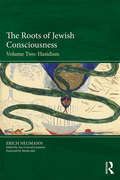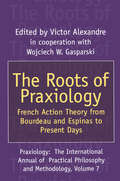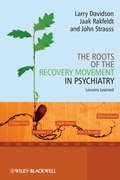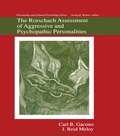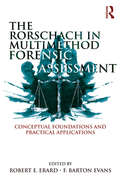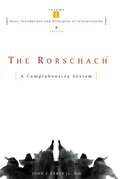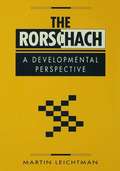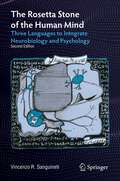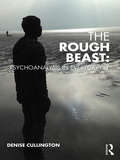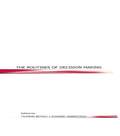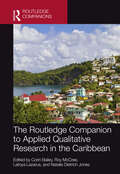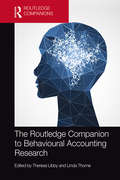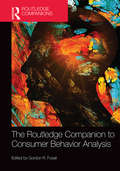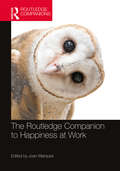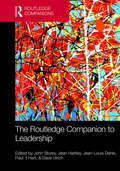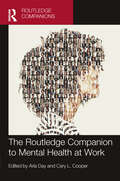- Table View
- List View
The Role of Trust in Mental Health: Vulnerability and Trust-Building in Theory and Practice
by Gerard LeaveyThis book offers a comprehensive examination of trust and its relationship with mental illness and wellbeing.Engaging with a broad range of mental health research, theory, and practice through various transdisciplinary theoretical models of trust, this book highlights the social and family contexts surrounding the making and breaking of trust and mental health. It examines various sociological conceptual and theoretical frameworks of risk and trust while also engaging with evolutionary perspectives on the human need for cooperation and trust. The author describes how, in a world of constant connectivity, the drawing of boundaries assigns some people as strangers, using stigma as a form of power. The book concludes by considering the future of mental health and where trust-building may be possible. Each chapter is interspersed with observations and insights from the author’s personal research covering many populations, communities and issues over several decades.Drawing on a wide range of interdisciplinary literature, the book will be of interest to mental health practitioners, researchers, and scholars interested in the psychosocial aspects of mental illness and stigma.
The Role of Unexpected Events in Stories: J. Bruner’s and C. Feldman’s Florentine Seminar (SpringerBriefs in Psychology)
by Andrea SmortiThis book stems primarily from the intention to make public the seminar entitled "Narratives and Cultural Psychology" held by J. Bruner and C. Feldman in May 2000 in Florence. This seminar represents the point of view of these two authors, at an important moment in their scientific and human careers, on two themes: narratives and interpretative communities.The central concept on which this book works is the Aristotelian concept of peripeteia which, born in the world of art, is developed by Bruner in the field of cognitive and cultural psychology and by Feldman in the concept of interpretative community.Thus the first purpose of this book is to analyze the role and usefulness of this concept in the study of the world of stories and cultureThe second aim of this book is to explain, clarify and comment on the concept, the theoretical assumptions and the key words used by the two authors, while also exploring the issues addressed. In this way, the author wanted to reflect on what contribution this seminar offers today to the theme of narratives and cultural psychology and what the future prospects might be.This book is aimed at students and scholars interested in exploring the role that stories play in human culture.
The Role of interest in Learning and Development
by Suzanne Hidi K. Ann Renninger Andreas KrappInterest is just emerging as a critical bridge between cognitive and affective issues in both learning and development. This developing "interest" in interest appears to be linked to an increasing concern for studying the individual in context, examining affective variables as opposed to purely structural features of text, analyzing the interrelationship of cognitive and social development, understanding practical applications of theories of motivation, and recognizing the importance of developmental psychology for the study of learning. This book addresses both how individual interest and interest inherent in stimuli (books, text, toys, etc.) across subjects affect cognitive performance. While the book's particular emphasis is on theory-driven research, each of the contributing authors offers a unique perspective on understanding interest and its effects on learning and development. As such, each has contributed a chapter in which particular questions in interest research are described and linked to a clearly stated theoretical perspective and recent findings. Relevant material from the broader literatures of psychology and education are analyzed in the context of these discussions. In addition, the introductory and concluding chapters build on the contributions to the volume by providing the basis of a coherent view of interest across genres such as stories and expository text, and domains as varied as play, reading, and mathematics.
The Role of the Patient-Analyst Match in the Process and Outcome of Psychoanalysis (Psychoanalysis in a New Key Book Series)
by Judy Leopold KantrowitzForewords by Theodore Jacobs and Donnel Stern The Role of the Patient-Analyst Match in the Process and Outcome of Psychoanalysis is a compilation of Judy Kantrowitz’s previously published papers on the patient-analyst "match" and its effect on the process and outcome of psychoanalysis. The match between patient and analyst places attention on the dynamic effect of interactions of character and conflict of both participants on the process that evolves between them—a spectrum of compatibility and incompatibility that is relevant to the analytic work. Classical psychoanalysis had been viewed as a "one-person" enterprise, with one analyst interchangeable with another. Analysts’ experiences of countertransference reactions were viewed as unresolved conflicts, reasons to return to personal treatment, not inevitable and potentially informative about the current analytic work. This view began to shift in the 1980s, with Judy Kantrowitz’s work contributing to the development of the recognition that psychoanalysis was a "two-person" process. In this collection of her most significant papers, Kantrowitz explores the importance of the match, which refers to observable styles, attitudes and personal characteristics that may be rooted in residual and unanalyzed conflicts, triggered in any patient-analyst pair. Match is neither a predictive nor static concept. Rather it refers to the unfolding transaction that itself that may shift and change during the course of analytic work. Pulling together the history of the shift in theory from the one-person to two-person understanding of the psychoanalytic enterprise, The Role of the Patient-Analyst Match in the Process and Outcome of Psychoanalysis will be of great interest to contemporary psychoanalysts.
The Roles of Representation in Visual Perception (Synthese Library #486)
by Berit Brogaard Robert FrenchThis volume contains new papers addressing a number of new and traditional issues pertaining to the roles of representations in visual perception.Among these issues is the one concerning the nature of the perceptual state itself – e. g. on the issue of whether the perceptual state, like its distal objects, is structured, for instance by possessing a spatial character. Other issues include those of whether at least aspects of the distal object are presented immediately to us visually, whether representation plays any (interesting) role in disjunctivist and naïve realist accounts of visual experience and the relationship among visual perception, attention and representation.The anthology includes a wide variety of positions on the subject of the roles of representations in visual perception, which would help to close the literature gap and will be of interest to scholars from all schools and trends of philosophy of mind.
The Romance of American Psychology: Political Culture in the Age of Experts
by Ellen HermanPsychological insight is the creed of our time. A quiet academic discipline two generations ago, psychology has become a voice of great cultural authority, informing everything from family structure to government policy. How has this fledgling science become the source of contemporary America's most potent ideology? In this groundbreaking book—the first to fully explore the political and cultural significance of psychology in post-World War II America—Ellen Herman tells the story of Americans' love affair with the behavioral sciences. It began during wartime. The atmosphere of crisis sustained from the 1940s through the Cold War gave psychological "experts" an opportunity to prove their social theories and behavioral techniques. Psychologists, sociologists, and anthropologists carved a niche within government and began shaping military, foreign, and domestic policy. Herman examines this marriage of politics and psychology, which continued through the tumultuous 1960s. Psychological professionals' influence also spread among the general public. Drawn by promises of mental health and happiness, people turned to these experts for enlightenment. Their opinions validated postwar social movements from civil rights to feminism and became the basis of a new world view. Fascinating and long overdue, this book illuminates one of the dominant forces in American society. This title is part of UC Press's Voices Revived program, which commemorates University of California Press's mission to seek out and cultivate the brightest minds and give them voice, reach, and impact. Drawing on a backlist dating to 1893, Voices Revived makes high-quality, peer-reviewed scholarship accessible once again using print-on-demand technology. This title was originally published in 1995.
The Romantic Crowd
by Mary FaircloughIn the long eighteenth century, sympathy was understood not just as an emotional bond, but also as a physiological force, through which disruption in one part of the body produces instantaneous disruption in another. Building on this theory, Romantic writers explored sympathy as a disruptive social phenomenon, which functioned to spread disorder between individuals and even across nations like a 'contagion'. It thus accounted for the instinctive behaviour of people swept up in a crowd. During this era sympathy assumed a controversial political significance, as it came to be associated with both riotous political protest and the diffusion of information through the press. Mary Fairclough reads Edmund Burke, Mary Wollstonecraft, William Godwin, John Thelwall, William Hazlitt and Thomas De Quincey alongside contemporary political, medical and philosophical discourse. Many of their central questions about crowd behaviour still remain to be answered by the modern discourse of collective psychology.
The Romantic Ethic and the Spirit of Modern Consumerism: New Extended Edition (Cultural Sociology)
by Colin CampbellOriginally published in 1987, Colin Campbell’s classic treatise on the sociology of consumption has become one of the most widely cited texts in sociology, anthropology, cultural studies, and the history of ideas. In the thirty years since its publication, The Romantic Ethic and the Spirit of Modern Consumerism has lost none of its impact. If anything, the growing commodification of society, the increased attention to consumer studies and marketing, and the ever-proliferating range of purchasable goods and services have made Campbell’s rereading of Weber more urgent still. As Campbell uncovers how and why a consumer-oriented society emerged from a Europe that once embodied Weber’s Protestant ethic, he delivers a rich theorization of the modern logics and values structuring consumer behavior. This new edition, featuring an extended Introduction from the author and an Afterword from researcher Karin M. Ekström, makes clear how this foundational work aligns with contemporary theory in cultural sociology, while also serving as major influence on consumer studies.
The Roots of Jewish Consciousness, Volume One: Revelation and Apocalypse
by Erich NeumannThe Roots of Jewish Consciousness, Volume One: Revelation and Apocalypse is the first volume, fully annotated, of a major, previously unpublished, two-part work by Erich Neumann (1905–1960). It was written between 1934 and 1940, after Neumann, then a young philosopher and physician and freshly trained as a disciple of Jung, fled Berlin to settle in Tel Aviv. He finished the second volume of this work at the end of World War II. Although he never published either volume, he kept them the rest of his life. The challenge of Jewish survival frames Neumann’s work existentially. This survival, he insists, must be psychological and spiritual as much as physical. In Volume One, Revelation and Apocalypse, he argues that modern Jews must relearn what ancient Jews once understood but lost during the Babylonian Exile: that is, the individual capacity to meet the sacred directly, to receive revelation, and to prophesy. Neumann interprets scriptural and intertestamental (apocalyptic) literature through the lens of Jung’s teaching, and his reliance on the work of Jung is supplemented with references to Buber, Rosenzweig, and Auerbach. Including a foreword by Nancy Swift Furlotti and editorial introduction by Ann Conrad Lammers, readers of this volume can hold for the first time the unpublished work of Neumann, with useful annotations and insights throughout. These volumes anticipate Neumann’s later works, including Depth Psychology and a New Ethic, The Origins and History of Consciousness, and The Great Mother. His signature contribution to analytical psychology, the concept of the ego–Self axis, arises indirectly in Volume One, folded into Neumann’s theme of the tension between earth and YHWH. This unique work will appeal to Jungian analysts and psychotherapists in training and in practice, historians of psychology, Jewish scholars, biblical historians, teachers of comparative religion, as well as academics and students.
The Roots of Jewish Consciousness, Volume Two: Hasidism
by Erich NeumannThe Roots of Jewish Consciousness, Volume Two: Hasidism is the second volume, fullyannotated, of a major, previously unpublished, two-part work by Erich Neumann (1905–1960). It was written between 1940 and 1945, after Neumann, then a young philosopher and physician and freshly trained as a disciple of Jung, fled Berlin to settle in Tel Aviv. He finished this work at the end of World War II. Although he never published it, he kept it the rest of his life. Volume Two, Hasidism, is devoted to the psychological and spiritual wisdom embodied in Jewish spiritual tradition. Relying on Jung’s concepts and Buber’s Hasidic interpretations, Neumann seeks alternatives to the legalism and anti-feminine bias that he says have dominated collective Judaism since the Second Temple. He argues that modern Jews can develop psychological wholeness through an appropriation of Hasidic legends, Talmudic texts, and Kabbalistic mysteries, including especially the Zohar. Exclusively, this volume includes a foreword by Moshe Idel. An appendix, Neumann’s four-lecture series from the 1940s, gives a glimpse of his intended, unpublished Part Three. These volumes anticipate Neumann’s later works, including Depth Psychology and a New Ethic, The Origins and History of Consciousness, and The Great Mother. In Volume Two, Hasidism, his concept of the ego–Self axis is developed in clearly psychological terms. Four previously unpublished essays, appended to Volume Two, illustrate Neumann’s developmental psychology, including his theme of primary and secondary personalization. This unique work will appeal to Jungian analysts and psychotherapists in training and in practice, historians of psychology, Jewish scholars, biblical historians, teachers of comparative religion, as well as academics and students.
The Roots of Praxiology: French Action Theory from Bourdeau and Espinas to Present Days (Praxiology: The International Annual Of Practical Philosophy And Methodology Ser.)
by Victor AlexandrePraxiology deals with working and doing from the point of view of effectiveness. It has three components: analysis of concepts involving purposive actions; critique of modes of action from the viewpoint of efficiency; and normative advisory aspects in recommendations for increasing human efficiency. This seventh volume of the Praxiology series focuses on the roots of the discipline. It brings together a selection of writings that illustrate various stages of French thought concerning this philosophy and methodology of action. It is also conceived as a tribute to the writings of Louis Bourdeau and V. Alfred Espinas, key figures in the origin of praxiology.In the first part, "The Origin of Praxiology" examines these origins in the work of Bourdeau and Espinas. Bourdeau's essay demonstrates the influence of contemporary theories, in particular those of evolution and Comte's positivism, but also shows the critical sense and originality of his thought. With reference to Greek philosophy, Espinas's contribution underlines the complex relations between acts and laws; it enables him to follow the slow progression of individuals as they endeavor to shape their destiny according to the circumstances and the direction of their attitudes. In the second part, "Science of Human Action," Maurice Blondel opposes radical rationalism and warns against the positive sciences. Abraham Moles and Elisabeth Rohmer offer an original approach inspired by phenomenology. In the third part, "Action Theory and Its Applications," the texts of Roland Caude and Arnold Kaufmann focus on humanist preoccupations, setting action in the economic context of the firm and the city. Victor Alexandre deals with the structural analysis of real and fictitious actions applied to a large number of elementary acts. Robert Vallée's concluding essay proposes a model consisting of operators for observation, decision, and effectiveness in order to formalize the link between knowledge and action.What emerges from this volume is the constant idea that an individual's destiny is linked to the efficiency of his acts, but also that efficiency as a concept itself has multiple aspects, none of which should be underestimated.
The Roots of the Recovery Movement in Psychiatry
by Larry Davidson John Strauss Jaak RakfeldtAs the global psychiatric community enters a new era of transformation, this book explores lessons learned from previous efforts with the goal of "getting it right" this time. In response to the common refrain that we know about and 'do' recovery already, the authors set the recovery movement within the conceptual framework of major thinkers and achievers in the history of psychiatry, such as Philippe Pinel, Dorothea Dix, Adolf Meyer, Harry Stack Sullivan, and Franco Basaglia.The book reaches beyond the usual boundaries of psychiatry to incorporate lessons from related fields, such as psychology, sociology, social welfare, philosophy, political economic theory, and civil rights. From Jane Addams and the Settlement House movement to Martin Luther King, Jr., and Gilles Deleuze, this book identifies the less well-known and less visible dimensions of the recovery concept and movement that underlie concrete clinical practice.In addition, the authors highlight the limitations of previous efforts to reform and transform mental health practice, such as the de-institutionalization movement begun in the 1950s, in the hope that the field will not have to repeat these same mistakes. Their thoughtful analysis and valuable advice will benefit people in recovery, their loved ones, the practitioners who serve them, and society at large.Foreword by Fred Frese, Founder of the Community and State Hospital Section of the American Psychological Association and past president of the National Mental Health Consumers' Association
The Rorschach Assessment of Aggressive and Psychopathic Personalities (Personality and Clinical Psychology)
by Carl B. Gacono J. Reid MeloyThis book provides a definitive empirical study of antisocial character pathology and its assessment through the use of the Rorschach. Drawing upon a decade of research with nearly 400 individuals in various hospitals and prisons, the authors paint an extraordinary intrapsychic picture of the personality structure and psychodynamics of these troublesome patients.Serving as both an educational tool and a reference text, this book presents: * Rorschach data on several different antisocial groups -- conduct disordered children and adolescents, antisocial personality disordered adult males with and without schizophrenia, antisocial adult females, and male and female sexual homicide perpetrators; * nomothetic (group) and idiographic (case study) data; * data which have been analyzed and theoretically interpreted using both structural methods and psychoanalytic approaches which represent the cutting edge of Rorschach theory and practice; and* a developmental approach in analyzing Rorschach data gathered from antisocial children, adolescents, and adults -- providing striking similarities. This is the first Rorschach database of this type that has ever been published. As such, it serves as a valuable reference text for Rorschach users -- providing a definitive empirical base, theoretical integration, and a focus on individuals who create severe problems for society.
The Rorschach in Multimethod Forensic Assessment: Conceptual Foundations and Practical Applications
by Robert E. Erard F. Barton EvansThis volume demonstrates how multimethod forensic assessment with the Rorschach adds incremental validity, insight, and practical value. Case discussions by leading forensic psychologists illustrate the integration of contemporary Rorschach assessment with the MMPI-2 and MMPI-2-RF, the PAI, and the HCR-20. This text addresses a wide range of forensic applications including child custody, psychological trauma, personal injury, psychotic offenders, competency evaluations, immigration cases, and impression management. It also shows how the recently developed Rorschach Performance Assessment System (R-PAS) effectively enhances the use of the Rorschach in forensic cases, while offering guidance for Comprehensive System users as well.
The Rorschach: A Comprehensive System (Fourth Edition) (Basic Foundations And Principles Of Interpretation #Volume 1)
by John E. ExnerThis new edition provides updated research and information on administering, scoring, and interpreting the Rorschach test, as well as new normative data, coverage of recent controversies and criticisms of the test, and illustrative case studies.
The Rorschach: A Developmental Perspective
by Martin LeichtmanMartin Leichtman's The Rorschach is a work of stunning originality that takes as its point of departure a circumstance that has long confounded Rorschach examiners. Attempts to use the Rorschach with young children yield results that are inconsistent if not comical. What, after all, does one make of a protocol when the child treats a card like a frisbee or confidently detects "piadigats" and "red foombas"? A far more consequential problem facing examiners of adults and children alike concerns the very nature of the Rorschach test. Despite voluminous literature establishing the personality correlates of particular Rorschach scores, neither Hermann Rorschach nor his intellectual descendants have provided an adequate explanation of precisely what the subject is being asked to do. Is the Rorschach a test of imagination? Of perception? Of projection? In point of fact, Leichtman argues, the two problems are intimately related. To appreciate the stages through which children gradually master the Rorschach in its standard form is to discover the nature of the test itself. Integrating his developmental analysis with an illuminating discussion of the extensive literature on test administration, scoring, and interpretation, Leichtman arrives at a new understanding of the Rorschach as a test of representation and creativity. This finding, in turn, leads to an intriguing reconceptualization of all projective tests that clarifies their relationships to more objective measures of ability.
The Rosetta Stone of the Human Mind: Three Languages to Integrate Neurobiology and Psychology
by Vincenzo R. SanguinetiThe study of the brain-mind complex has been hampered by the dichotomy between objective biological neuroscience and subjective psychological science. This book presents a new theoretical model for how to "translate" between the two, using a third language: nonlinear physics and mathematics. It illustrates how the simultaneous use of these two approaches enriches the understanding of the neural and mental realms.
The Rough Beast: Psychoanalysis In Everyday Life
by Denise CullingtonThe past continues to operate powerfully, wordlessly, in that less conscious part of our human mind and can trip us up unexpectedly. We can perceive and respond to situations in ways which are more to do with early experiences than the present. We can push from mind what we would rather not know. Feelings such as doubt and sadness can seem too weak; envy and anger, too bad; feeling small and in any way in need, could leave us too vulnerable. Though most will never have their own experience of psychoanalysis (or less intensive psychoanalytic psychotherapy), psychoanalytic ideas can be profoundly helpful in making sense of ourselves. Having some access to those more hidden parts of our human mind, we can feel more alive, more real and less likely to act out in unexpected ways. An accessible, sympathetic and challenging guide, The Rough Beast: Psychoanalysis in Everyday Life is for all those who are curious and sceptical as to what, why and how psychoanalytic understanding is useful in everyday life.
The Routines of Decision Making
by Tilmann Betsch Susanne HaberstrohExperience is currently a hot theme in decision making. For a long time, decision research was almost exclusively focused on new decisions and neglected the importance of experience. It took the field until the 1990s for a new direction in research and theorizing to become visible in the literature. There are parallel movements happening in sociology, political science, social psychology, and business.The purpose of this edited book is to provide a balanced and representative overview of what is currently known about the dynamics of experienced-based decision making. The chapters are written by renowned experts in the field and provide the latest theoretical developments, integrative frameworks, and state-of-the-art reviews of research in the laboratory and in the field.
The Routledge Companion to Applied Qualitative Research in the Caribbean (Routledge Companions)
by Corin Bailey Roy McCree Latoya Lazarus Natalie Dietrich JonesThis cutting-edge book provides a comprehensive examination of applied qualitative research in the Caribbean. It highlights the methodological diversity of qualitative research by drawing on various approaches to the study of Caribbean society, addressing the lack of published qualitative research on the region. Featuring 17 chapters, the book covers five key areas, namely Overview and Introduction; Gender, Crime, and Violence; Gender and Intimate Partner Violence; Health, Management, and Public Policy; and Migration and Tourism. Throughout the course of the book, the chapters explore how different kinds of qualitative research can be used to inform public policy and help deal with a myriad of socioeconomic problems that affect Caribbean people. The book further uses distinct approaches to showcase a diverse selection of qualitative research methods, such as autoethnography, life history, narrative enquiry, participants’ observation, grounded theory, case study, and critical discourse. The book will be beneficial for students and scholars both from the Caribbean and internationally who are engaged in the conduct of qualitative empirical enquiry. It will further hold appeal to advanced undergraduate level classes and postgraduate students along with scholars in the fields of social sciences and education.
The Routledge Companion to Behavioural Accounting Research (Routledge Companions in Business and Management)
by Theresa Libby Linda ThorneBehavioural research is well established in the social sciences, and has flourished in the field of accounting in recent decades. This far-reaching and reliable collection provides a definitive resource on current knowledge in this new approach, as well as providing a guide to the development and implementation of a Behavioural Accounting Research project. The Routledge Companion to Behavioural Accounting Research covers a full range of theoretical, methodological and statistical approaches relied upon by behavioural accounting researchers, giving the reader a good grounding in both theoretical perspectives and practical applications. The perspectives cover a range of countries and contexts, bringing in seminal chapters by an international selection of behavioural accounting scholars, including Robert Libby and William R. Kinney, Jr. This book is a vital introduction for Ph.D. students as well as a valuable resource for established behavioural accounting researchers.
The Routledge Companion to Consumer Behavior Analysis (Routledge Companions in Business, Management and Accounting)
by Gordon R. FoxallThe Routledge Companion to Consumer Behavior Analysis provides a unique and eclectic combination of behavioral, cognitive and environmental perspectives to illuminate the real-world complexities of consumer choice in a marketing-oriented economy. Edited by a leading authority in the field, the contributing authors have created a unique anthology for understanding consumer preference by bringing together the very latest research and thinking in consumer behavior analysis. This comprehensive and innovative volume ranges over a broad multi-disciplinary perspective from economic psychology, behavioral psychology and experimental economics, but its chief focus is on the critical evaluation of consumer choice in the natural settings of affluent, marketing-oriented economies. By focussing on human economic and social choices, which involve social exchange, it explores and reveals the enormous potential of consumer behavior analysis to illuminate the role of modern marketing-oriented business organizations in shaping and responding to consumer choice. This will be of particular interest to academics, researchers and advanced students in marketing, consumer behavior, behavior analysis, social psychology, behavioral economics and behavioral psychology.
The Routledge Companion to Happiness at Work (Routledge Companions in Business, Management and Marketing)
by Joan MarquesAn unprecedented and important reference work, this research companion covers a range of aspects of happiness, an aim everyone aspires to achieve, yet can be easily overlooked in today’s demanding and multi-challenged world, or confused with a plethora of quantifiable or career goals. This book helps readers to internalize happiness, form a healthy opinion about this emotion, and detach it from external factors that can only cause temporary discomfort or delight. A group of expert authors considers happiness within three critical realms: internally, interactively, and work-related. Their thoughtful contributions approach happiness from a multiplicity of angles, and present a full spectrum of backgrounds and perspectives to consider, based on a wide range of circumstances, personal and professional. This companion will be valuable for researchers, students, and coaches, whether they seek input for future theory development, or motivation for performance in personal and professional life.
The Routledge Companion to Leadership (Routledge Companions in Business, Management and Accounting)
by John Storey David Ulrich Paul 'T Hart Jean Hartley Jean-Louis DenisLeadership has never been more important – and divisive – than it is today. The idea and discourse of the leader remains a critical factor in organizational and societal performance, but there is evident tension between the persistent focus on the critical importance of individual leaders and the increasing emphasis on collective leadership. The Routledge Companion to Leadership provides a survey of the contentious and dynamic discipline of leadership. This collection covers key themes in the field, including advances in leadership theory, leadership in a range of contexts and geographies, leadership failure, leadership process, and leadership development. Topics range from micro studies to wider political analyses of leadership, taking in unusual but important aspects such as portrayals of leadership in architecture, media, and science fiction. Contributions from 61 internationally renowned authors from 16 countries make available the full range of perspectives, approaches, and insights on the idea of leadership. Providing both a social sciences and a psychological approach, these go beyond common themes to offer diverse perspectives on such topics as emotion and leadership, portrayals of leadership. This volume situates leadership debates and evidence within contemporary leadership crises, while ensuring that the explorations of the issues are of enduring relevance. With wide and critical coverage of the key topics and potent contextualization of themes in current events, The Routledge Companion to Leadership is the ideal resource for graduate study in leadership.
The Routledge Companion to Mental Health at Work (Routledge Companions in Business and Management)
by Cary L. Cooper Arla DayThe issue of mental health at work has become a hot topic in both the popular media and academic writings. Although job stress and mental ill-health are associated with negative outcomes for individuals, teams, and organizations, there has been some suggestion that changing the work environment and creating healthy workplaces can improve worker health. Much of the current works in the general of health is fractured, coming from a variety of disciplines and perspectives without an organizing framework to help guide research and practice in the area. Having this individualized, compartmentalized perspective constrains our ability to fully understand the scope of the issue, the key factors in supporting or detracting from one’s mental health, and interventions focusing on mental health at work. Given the importance of understanding mental health at work and the current lack of coverage on workplace mental health, there is a need for a book to provide a holistic overview of the issue targeting the environmental, individual, and group influences of mental health and well-being, as well as the impact on individuals and workplaces. This handbook provides a conceptual framework for examining these issues. Each chapter offers an in-depth examination of the key facets of mental health at work, focusing both on the seminal and current literature on the topic and practical suggestions for best practices for organizations. With contributions from leading experts, authors address the state-of-the-art research and integrate current events that are shaping the way we work and our wellbeing at work. This edited collection will be of interest to researchers, academics, policymakers, and advanced students in the fields of human resource management, organizational psychology, and management.
